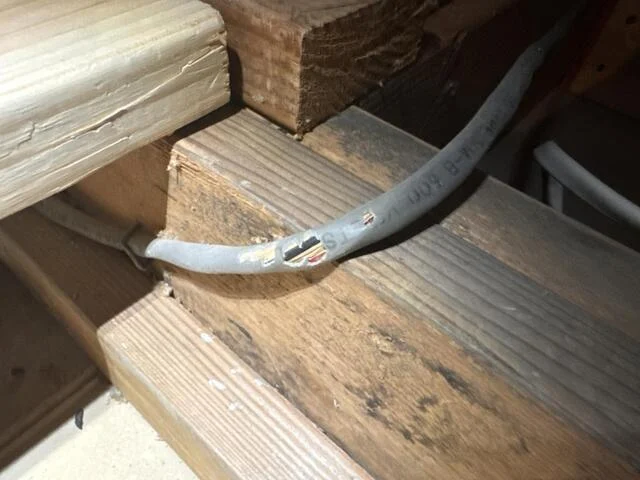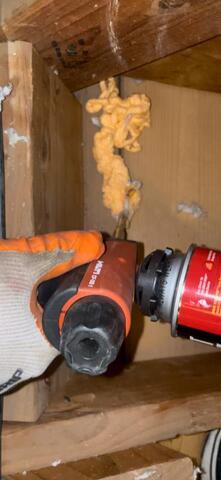RATS! Why Rodents In Your Attic Are More than Just a Nuisance
It seems crazy to say this during another 100+ degree heat wave, but the cooler half of the year is just around the corner. While most of us welcome the respite from the heat, one thing no homeowner wants to welcome is rodents into their house. Mice, rats, squirrels, and other small creatures can cause serious damage to your home if they make your attic their home. Here’s why having rodents in your attic is beyond just bothersome and what steps you can take to mitigate the havoc they wreak.
1. Structural Damage
Rats love to chew on objects, and unfortunately, your attic offers them a lot of opportunities. They go for wiring, wood, insulation, and even belongings you may be storing in your attic. This can reduce your home’s structural integrity over time. Rodents can chew through hardwood joists, rafters, and beams which — you guessed it — equate to costly repairs. Insulation loses some of its efficiency when if weakened, and less effective insulation means increased heating and cooling costs. You also run the risk of rodents chewing through electrical wire, which could result in appliances not working or even a fire.
2. Fire Hazards
Because of their love for gnawing, rodents living in your attic also mean a potentially serious fire risk. When electrical wires are exposed, they can spark and potentially ignite insulation or wooden beams. The National Fire Protection Association (NFPA) has stated that about 25% of house fires of unknown origin are caused by rodents. This risk is even higher in older homes where the wiring may already be compromised due to its age.

3. Health Risks
Rodents are well-known for carrying disease. They can pass these diseases on to humans, either through bites and scratches or through indirect contact with contaminated materials. These diseases include Hantavirus and Leptospirosis, which can be passed on through contact with feces and urine-contaminated insulation. Rodents also bring fleas and ticks along for the ride, which carry a host of their own diseases.
Rodents like to nest in insulation. Many people think that rodents will only nest in certain types of insulation, but in reality, we’ve seen rodents in everything from fiberglass to cellulose to batting. This nesting not only reduces the effectiveness of your insulation but also poses health risks. Especially in a material like cellulose, which is naturally very dusty, the rodent feces and urine can easily become airborne. For people with allergies, asthma, or other respiratory issues, this can worsen symptoms. Even for those without health conditions, exposure to rodent-contaminated insulation can cause respiratory issues, headaches, and other symptoms.
4. Pest Infestations
One rodent can turn into ten in what feels like the blink of an eye. Rodents breed quickly, and what may start as a small problem can quickly escalate into a full-blown infestation. As many of our customers know firsthand, the presence of rodents can attract other pests to your home too. Everything from snakes to insects like fleas, ticks, and mites, you can have an entire ecosystem living in your attic cascading the negative effects of pests invading your home.
5. Noise and Disruption
I can personally attest to how frustrating it is to be able to hear the clawing and scurrying of rodents in your attic and walls. Rodents are most active at night, and hearing them making noise and imagining the damage that they’re doing is maddening.
So What Can You Do to Prevent Rodents From Entering Your Attic?
1. Install rodent-proof barriers at all potential entry points.
This process is meticulous but is well worth the effort. If they can’t move in and out of your attic freely, the ones trapped inside will eventually die and you can remove them.
We use mesh barriers for our attic restorations and have found that they work great. That’s why we’re able to offer a 6-month rodent re-entry guarantee and have never had one homeowner tell us that the rodents returned.
Just be sure to block off even the smallest potential entry points. Rodents can squeeze through holes a quarter of an inch in diameter and can jump about a foot to access holes and gaps. They’re also fantastic climbers so when in doubt, seal the hole.
2. Keep your attic clean.
Hopefully, it goes without saying that you should not store food in your attic. But you should also ensure your attic space is free of animal urine or feces, which just acts as an invitation for more animals to come and mark their territory.
We use DSV sanitizer in our attic restoration process. This both cleans and sanitizes the attic, eliminating the scents that rodents are attracted to. You’ll want to be sure to sanitize every part of your attic, not just the visible spaces. This will either mean moving or removing the insulation yourself, or calling a professional like Tyson to do it for you.
3. Air-seal any potential leakage points.
This is done to prevent the possibility of contaminated air flowing from your attic into the living spaces of your home. Again, you’ll want to be sure to include the surfaces under your current insulation, so you’ll either need to move it yourself or have Tyson do it for you.

4. Check your wires and ducts.
If you notice that wires have indeed been gnawed through, contact an electrician to repair them. If you have ducts that have been gnawed through, you’ll need to repair or replace them. We use mastic to repair ducts. Duct tape will quickly lose its stickiness and disintegrate, so don’t use it in your attic.
Conclusion
Rodents in your attic are more than just a pain in the butt — they are a real threat to your home and health. Their mere presence can mean long-term consequences for your family and the structure of your home. If you suspect that you have a rodent problem in your attic, you must address it immediately. Tyson’s attic restoration process addresses not only the rodent problem but also immediately improves your home’s indoor air quality and can reduce heating and cooling costs by up to 50% for the life of your home.
Give Tyson Energy Solutions a call. We will inspect your attic, take pictures of exactly what the issues are, and explain potential solutions. We can help you enjoy the numerous benefits of an attic restoration, including eliminating any unwanted guests.

